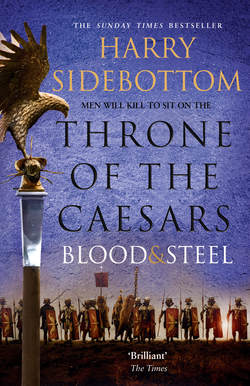Читать книгу Blood and Steel - Harry Sidebottom - Страница 18
Chapter 10
ОглавлениеRome
The Carinae,
Eight Days before the Ides of March, AD238
The door was shut. No doubt it was locked and barred. The same would be true of the only other entrance at the rear of the house. It was not yet mid-morning, the second hour of the day, still the time of negotium, when public business was done. Normally the front door would be open, and the Senator Tiberius Pollienus Armenius Peregrinus would be receiving his friends and clients. The times were far from normal. The plebs were out on the streets. The rain had not checked them. There was nothing else to stop them running riot. Neither Sabinus, the Prefect of the City, nor Potens, the Prefect of the vigiles, had been seen in the two days since Vitalianus had been murdered. The men of the Urban Cohorts and the Watch had remained in their barracks. Robbery and murder stalked the Seven Hills. All the luxurious houses in the Carinae district of the Esquiline were tightly shuttered. If Armenius thought it would keep him safe, he was much mistaken.
Timesitheus watched from a recessed doorway, across and down the street. Two bulky men, also hooded and cloaked, stood at his back. It reminded Timesitheus of another time and place. Mogontiacum on the northern frontier, three years before, standing with Maximinus, waiting to burst into the house of Petronius Magnus, and arrest him and his fellow Senators. It had been raining then too.
Some men would say the cases were entirely different. Magnus and the others had been traitors. This thing with Armenius was a personal vendetta. Those men would be wrong. Like everything, both were about self-interest.
Timesitheus despised the hypocrisy of men who clothed their actions in fine-sounding words, even to themselves. Justice was all very well, if it fitted with advantage. Step by step, with infinite care, Timesitheus had led Magnus and his friends into conspiracy. But if they had not been treacherous, they would have denounced him. As Tranquillina had said, best he, rather than another, reap the rewards of exposing their true nature. No one had clearer sight than his wife.
It was the same with Armenius. From obscure equestrian origins on a backwater Greek island, Timesitheus had risen high, the governor of provinces, the councillor of Emperors. He had drawn handsome profits from a succession of military and civil offices, but he had taken no more than was his due. When one of the great patrons of his youth had died, he had left Timesitheus a substantial inheritance. But, on his deathbed, Pollienus Auspex had adopted Armenius. Now the senatorial legacy hunter was contesting the bequest to Timesitheus. Given his connections, Armenius was likely to win the court case.
Timesitheus would not be robbed of what was his by right. Just as Magnus and the others had died because their souls were tainted by treachery, so Armenius would suffer for his avarice.
A squall gusted up the empty street, fat raindrops spattering the pavement. It was near time. Timesitheus hoped that the young cutpurse would be as good as his word. The oaths taken meant nothing, but Castricius had been well paid, and the promise of plunder should outweigh the inclement weather.
Timesitheus thought about that morning in Mogontiacum; the rain falling in sheets, the door splintering, the torchlight glinting on steel. Maximinus could fight, but he had done nothing right since he had become Emperor. The elite hated and feared him for his executions and confiscations. He had never travelled to Rome to attempt to conciliate the Senate. The plebs loathed him for curtailing the games and stealing the treasures from the temples. He had doubled the pay of the troops, but the expense was unsupportable, and soldiers alone could never keep an Emperor on the throne. Maximinus would not survive long. But would this be the revolt that toppled him? Gordian the Elder was an old man, and Africa held no legions. The Senators were better at talking than fighting. They had neither won over Sabinus and Potens, and thus the troops in their charge, nor liquidated them. The Senators commanded no troops in Rome.
